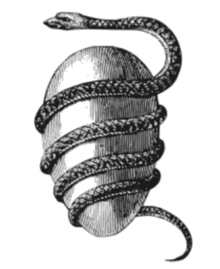- Ophion
-
This article is about a figure in Greek mythology. For the genus of parasitic wasps, see Ichneumonidae.
Greek deities
seriesPrimordial deities Titans and Olympians Chthonic deities Personified concepts Other deities Aquatic deities In some versions of Greek mythology, Ophion (Ὀφίων "serpent"), also called Ophioneus (Ὀφιονεύς) ruled the world with Eurynome before the two of them were cast down by Cronus and Rhea.
Sources
Pherecydes of Syros's Heptamychia is the first attested mention of Ophion.
The story was apparently popular in Orphic poetry, of which only fragments survive.
Apollonius of Rhodes in his Argonautica (1.495f) summarizes a song of Orpheus:
- He sang how the earth, the heaven and the sea, once mingled together in one form, after deadly strife were separated each from other; and how the stars and the moon and the paths of the sun ever keep their fixed place in the sky; and how the mountains rose, and how the resounding rivers with their nymphs came into being and all creeping things. And he sang how first of all Ophion and Eurynome, daughter of Oceanus, held the sway of snowy Olympus, and how through strength of arm one yielded his prerogative to Cronos and the other to Rhea, and how they fell into the waves of Oceanus; but the other two meanwhile ruled over the blessed Titan-gods, while Zeus, still a child and with the thoughts of a child, dwelt in the Dictaean cave; and the earthborn Cyclopes had not yet armed him with the bolt, with thunder and lightning; for these things give renown to Zeus.
Lycophron (1191) relates that Zeus' mother, that is Rhea, is skilled in wrestling, having cast the former queen Eurynome into Tartarus.
Nonnus in his Dionysiaca has Hera say (8.158f):
- I will go to the uttermost bounds of Oceanus and share the hearth of primeval Tethys; thence I will pass to the house of Harmonia and abide with Ophion.
Harmonia here is probably an error in the text for Eurynome. Ophion is mentioned again by Nonnus (12.43):
- Beside the oracular wall she saw the first tablet, old as the infinite past, containing all the things in one: upon it was all that Ophion lord paramount had done, all that ancient Cronus accomplished.
We also have fragments of the writings of the early philosopher Pherecydes of Syros (6th century BCE) who devised a myth or legend in which powers known as Zas and Chronos 'Time' and Chthonie 'Of the Earth' existed from the beginning and in which Chronos creates the universe. Some fragments of this work mention a birth of Ophioneus and a battle of the gods between Cronus (not Chronos) on one side and Ophioneus and his children on the other in which an agreement is made that whoever pushes the other side into Ogenos will lose and the winner will hold heaven.
Eusebius of Caesarea in his Praeparatio Evangelica (1.10) cites Philo of Byblos as declaring that Pherecydes took Ophion and the Ophionidae from the Phoenicians.
Interpretations
Robert Graves in his book The Greek Myths imaginatively reconstructs a Pelasgian creation myth involving Ophion as a serpent created by a supreme goddess called Eurynome dancing on the waves. She is fertilized by the serpent and in the form of a dove lays an egg on the waters about which Ophion entwines until it hatches and the world issues forth. Then Ophion and Eurynome dwell on Mt. Olympus until Ophion's boasting leads Eurynome to banish him to the darkness below the earth.
Greek mythology (deities) Primordial
deitiesMoirai (Fates)Titan
deitiesTitanesTitanidesHyperionidesKoionidesKrionidesIapetionidesOlympian
deitiesDodekatheonTheoi OlympioiMousai (Muses)Charites (Graces)- Aglaea
- Euphrosyne
- Thalia
Horae (Hours)StyktidesOceanic
deitiesTheoi HalioiChthonic
deitiesTheoi KhthonioiErinyes (Furies)Earthborn- Hecatonchires
- Cyclopes
- Gigantes
- Kouretes
- Meliae
- Telkhines
- Typhon
Apotheothenai- Iacchus
- Trophonius
- Triptolemus
- Orpheus
- Minos
- Aeacus
- Rhadamanthys
Categories:- Greek gods
- Greek mythology
Wikimedia Foundation. 2010.

